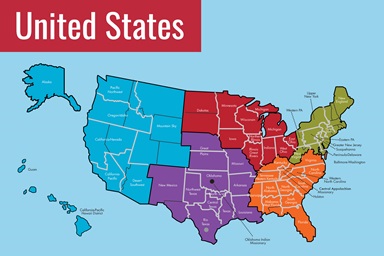Key points:
- The United Methodist Council of Bishops asked about the constitutionality of revisions to the process for handling complaints against bishops.
- The revisions passed at the same General Conference that also moved forward a constitutional amendment to allow the Council of Bishops to have a role in holding members accountable.
- The denomination’s top court upheld the new provisions in church law. However, two members dissented from the ruling.
A church law that allows the Council of Bishops to step in when a fellow bishop faces a complaint is in line with The United Methodist Church’s constitution, the denomination’s top court ruled.
In Decision 1484, the Judicial Council responded to questions raised by the Council of Bishops about Paragraph 413.3d(ii) and (iv) in the Book of Discipline, the denomination’s law book. General Conference, the denomination’s top lawmaking body, added the two provisions to the Discipline in 2016.
“The details of ¶ 413.3d(ii) & (iv) in no way violate the constitution of the United Methodist Church,” the Judicial Council said in the decision released on April 25.
Two members signed a dissent to the majority’s ruling, saying they would have found the two provisions unconstitutional. To strike down the provisions, at least six of the Judicial Council’s nine members would have needed to rule them unconstitutional.
The added provisions to Paragraph 413 mark a change in the process used for bishop accountability.
Historically, a complaint that a bishop is ineffective or guilty of a chargeable offense has been handled entirely within the church region where the bishop was elected. That means adjudication happens within an accused U.S. bishop’s jurisdiction or within an accused African, European or Filipino bishop’s central conference.
The revised Paragraph 413 still says a complaint against a bishop first must be submitted to the president of the college of bishops in that bishop’s region — or to the college’s secretary if the president is the one under complaint.
Subscribe to our
e-newsletter
But the revised paragraph now sets a definitive timeline of 180 days for a college of bishops — in consultation with the region’s episcopacy committee — to resolve, dismiss or refer the complaint to either the denomination’s administrative or judicial process.
If that doesn’t happen, the revised paragraph says the Council of Bishops must select a panel from its number to take up the matter.
If the bishop under complaint is from the U.S., the panel has five bishops — one from each jurisdiction. If the bishop is from Africa, Asia or Europe, the panel has three bishops — one from each continent.
It will then be up to the panel to either dismiss or refer the complaint within 180 days. The Episcopal Fund, which supports the work of bishops, pays for the costs associated with the panel’s work.
The revised Paragraph 413 also allows the Council of Bishops — at any time in the complaint process, including after a just resolution — to remove a complaint from a college of bishops by a two-thirds vote.
In asking about the new provision’s constitutionality, the Council of Bishops also asked questions about how to put its process into action while assuring fair process for individuals under complaint.
“The request for clarification on disciplinary provisions from the Council of Bishops is beyond the purview of the Judicial Council,” the church court said in Decision 1484.
The decision added: “The Judicial Council has held consistently that the General Conference is the body who addresses such matters. Until the General Conference changes the provisions of ¶ 413.3d(ii) and (iv), it is the law of The United Methodist Church.”
General Conference’s additions to Paragraph 413 came amid a multipronged effort aimed at giving the Council of Bishops a greater role in oversight of its members.
The same 2016 General Conference that adopted the revisions to Paragraph 413 by a 693-111 vote also moved forward an amendment to Paragraph 50 in the denomination’s constitution.
The amendment says General Conference can adopt provisions for the Council of Bishops “to hold its individual members accountable for their work, both as general superintendents and as presidents and residents in episcopal areas.”
While most legislation before a General Conference requires only a simple majority to pass, a constitutional amendment first requires at least a two-thirds majority vote at the global legislative assembly. To be ratified, an amendment then must win at least 67% of the total votes at annual conferences, regional bodies that meet around the world.
The Council of Bishops announced the ratification of the amendment to Paragraph 50 in 2018. The amendment received 81.2% of annual conference votes — 38,087 yes and 8,828 no.
The amendment supersedes a 1980 ruling by the Judicial Council, which held that it was unconstitutional for the Council of Bishops to hold its members accountable.
In their dissent, Judicial Council members Deanell Reece Tacha and the Rev. Øyvind Helliesen said they took into consideration both the amended Paragraph 50 and previous Judicial Council decisions related to fair process for people under complaint.
“As written, ¶¶ 413.3e(ii) and (iv) are unconstitutionally vague and do not contain a process that safeguards the due process rights of a bishop under complaint,” the dissent said.
When ruling on the constitutionality of a General Conference action, the Judicial Council must have a full roster of nine present. The Rev. Diana DeWitt, third clergy alternate, participated in this decision.
The Rev. Luan-Vu Tran recused himself and did not participate in any of the proceedings related to this decision. He previously served under Bishop Minerva Carcaño, one of the bishops currently under complaint, when she was bishop of the California-Pacific Conference.
Hahn is assistant news editor for UM News. Contact her at (615) 742-5470 or newsdesk@umnews.org.To read more United Methodist news, subscribe to the free Daily or Friday Digests.




